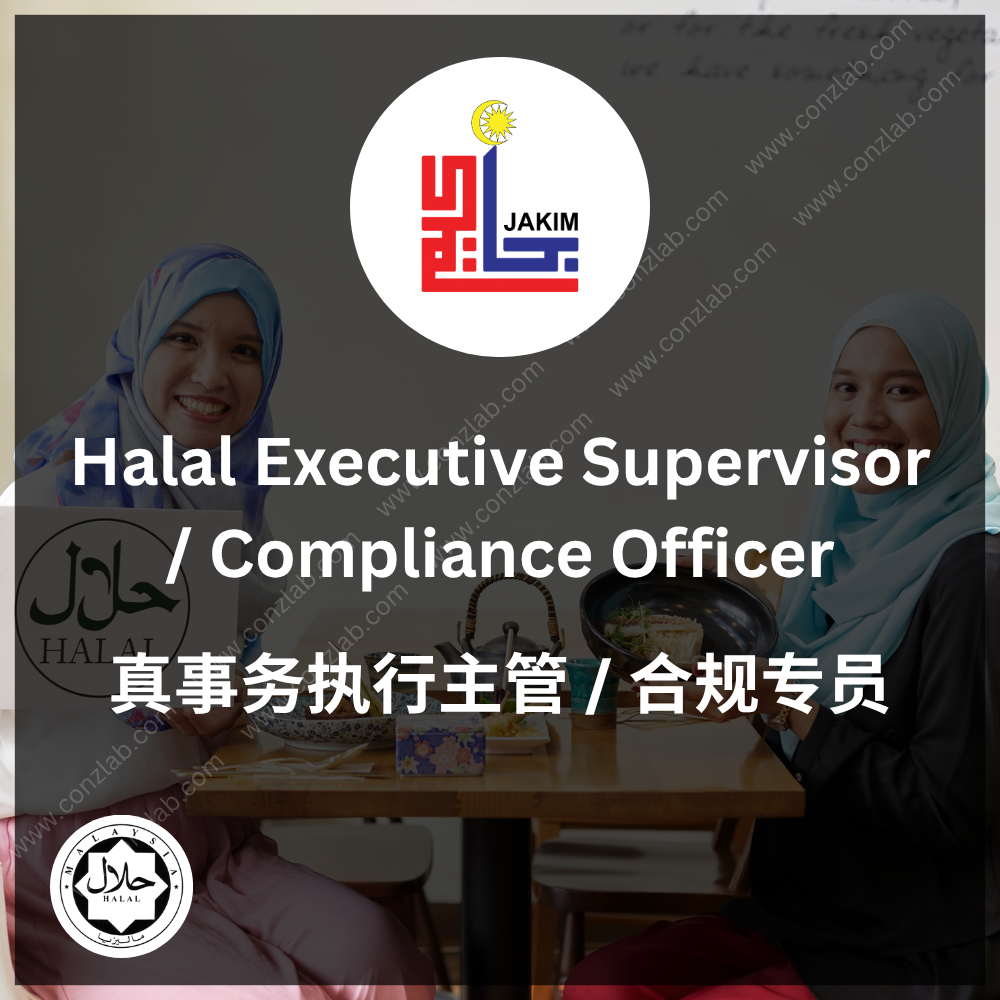Description
- A HALAL SKM Executive Supervisor / Compliance Officer is responsible for ensuring that the operations, processes, and practices of a company comply with HALAL certification standards as outlined by JAKIM (Department of Islamic Development Malaysia) and the Malaysia Halal Standard (MS 1500:2019). This role involves overseeing the implementation of HALAL practices, managing audits, and ensuring adherence to Shariah principles in the production and supply chain.
GOV Department
-
JAKIM
License Name (Malay)
-
Penyelia Eksekutif SKM HALAL / Pegawai Pematuhan
Details
- Responsibilities:
- Monitor the organization’s compliance with HALAL certification requirements.
- Prepare and maintain HALAL documentation, including product ingredient lists, supplier certifications, and audit reports.
- Conduct internal audits and staff training on HALAL practices.
- Liaise with JAKIM and other regulatory bodies for certification applications, renewals, and audits.
- Report non-compliance issues and take corrective actions promptly.
- Develop and implement a HALAL assurance system (HAS) for ongoing compliance.
- Qualifications:
- Knowledge of Malaysia Halal Standards (MS 1500:2019).
- Familiarity with HALAL certification procedures and requirements.
- Training or certification in HALAL compliance, such as HALAL Executive or Compliance Officer courses from recognized institutions.
- Strong organizational, documentation, and communication skills.
- Workplaces:
Food manufacturers, central kitchens, restaurants, cosmetic companies, logistics providers, and any organization seeking or maintaining HALAL certification.
Important Rules
- Mandatory Appointment: Companies applying for HALAL certification must designate a qualified HALAL Compliance Officer.
- Ongoing Training: Compliance Officers must attend regular training and updates to stay aligned with the latest HALAL standards and regulations.
- HALAL Assurance System (HAS): Must implement a HAS that ensures continuous compliance with HALAL requirements.
- Documentation: Maintain up-to-date records for audits, including supplier certifications, ingredient traceability, and standard operating procedures.
- Internal Audits: Conduct routine internal audits to identify and rectify non-compliance before external inspections.
Compound & Punishment
- Failure to Appoint a HALAL Compliance Officer:
- Fine: Up to RM 50,000 or equivalent penalties, depending on company size.
- Rejection of HALAL Certification Application.
- Non-Compliance Detected During Audit:
- Temporary Suspension: HALAL certification may be suspended until compliance is rectified.
- Fine: Up to RM 10,000 for each instance of non-compliance.
- Falsified Documentation or Fraudulent Practices:
- Revocation of HALAL Certification: Immediate revocation with public blacklisting by JAKIM.
- Legal Action: Criminal prosecution under Trade Descriptions Act 2011 (Act 730).
- Fine: Up to RM 200,000 for companies or RM 100,000 for individuals.
- Imprisonment: Up to 3 years for individuals.
- Failure to Address Consumer Complaints:
- Penalty: Monetary fines or certification suspension until issues are resolved.
- Failure to Appoint a HALAL Compliance Officer:
- Fine: Up to RM 50,000 or equivalent penalties, depending on company size.
- Rejection of HALAL Certification Application.
- Non-Compliance Detected During Audit:
- Temporary Suspension: HALAL certification may be suspended until compliance is rectified.
- Fine: Up to RM 10,000 for each instance of non-compliance.
- Falsified Documentation or Fraudulent Practices:
- Revocation of HALAL Certification: Immediate revocation with public blacklisting by JAKIM.
- Legal Action: Criminal prosecution under Trade Descriptions Act 2011 (Act 730).
- Fine: Up to RM 200,000 for companies or RM 100,000 for individuals.
- Imprisonment: Up to 3 years for individuals.
- Failure to Address Consumer Complaints:
- Penalty: Monetary fines or certification suspension until issues are resolved.
Advisor

Licensing Advisor Ms Mira
Ms. Mira, your dedicated licensing advisor, offers expert guidance on business licenses, permits, and regulatory compliance. Simplify your licensing process today!
Commonly Asked Questions
They oversee HALAL compliance, monitor daily processes, manage documentation, and ensure all operations follow JAKIM and MS 1500:2019 standards.
Yes. Every company applying for or maintaining HALAL certification must appoint a qualified officer recognized by JAKIM.
Individuals with HALAL training or certification, such as those from HALAL Professional Board (HPB) or recognized HALAL training bodies.
HAS is a management system that ensures continuous HALAL compliance in operations, documentation, and product handling.
Any organization handling food, beverages, cosmetics, pharmaceuticals, or logistics involved in HALAL-certified operations.
Training is recommended every 1–2 years to stay updated with new HALAL standards and regulatory changes.
The business may face fines, certification suspension, or public blacklisting by JAKIM.
Yes, but each branch must maintain separate HALAL records and audits to ensure consistent compliance.
Ingredient lists, supplier HALAL certificates, internal audit reports, staff training logs, and HAS implementation records.
Companies can be blacklisted, fined up to RM200,000, or face imprisonment under the Trade Descriptions Act 2011.


